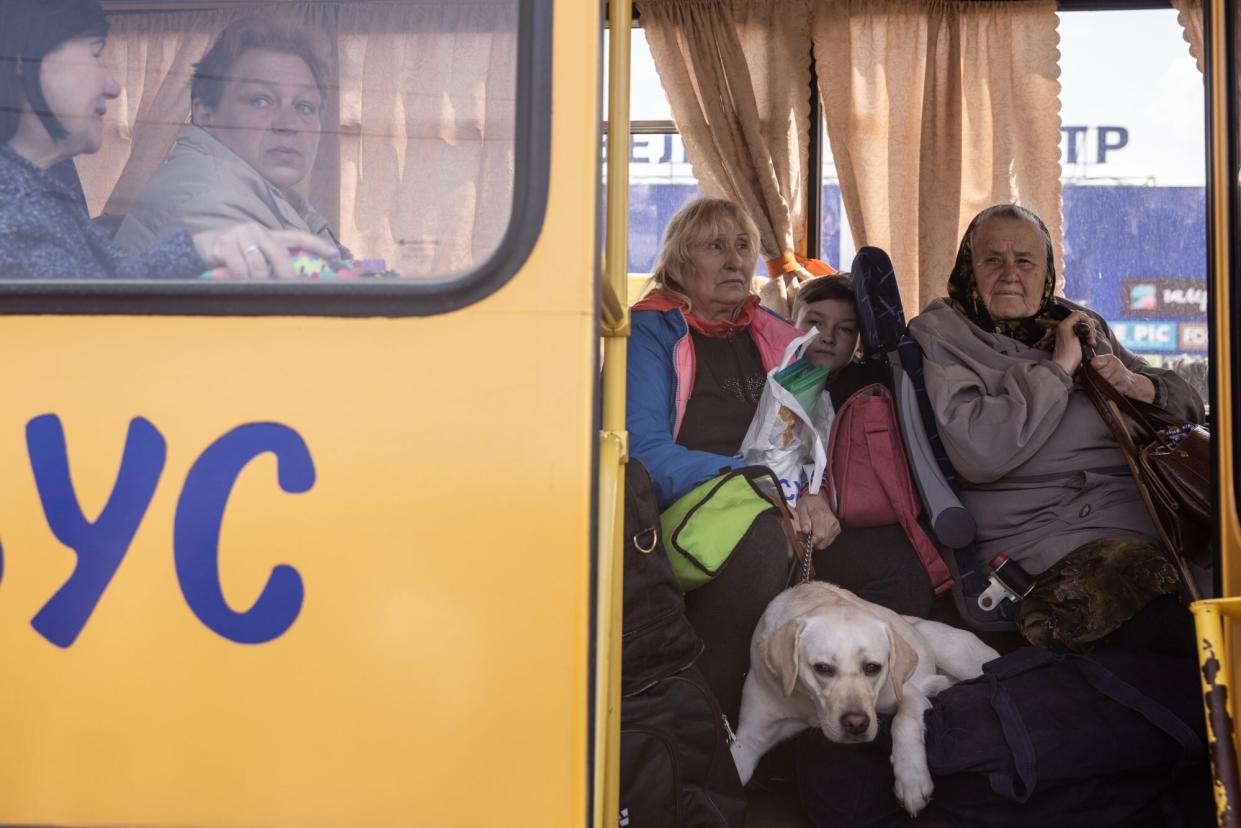Ukrainian Evacuees Recount Hiding in Bunkers for Months Amid Russian Bombing in Mariupol: 'I Was Hysterical'

Chris McGrath/Getty Evacuees Arrive In Zaporizhzhia
The first group of evacuees from the besieged Ukrainian town of Mariupol are describing the horrors of what they witnessed as they hid in bunkers beneath a steel plant, all while Russian bombs fell above them.
"When the bunker started to shake, I was hysterical, my husband can vouch for that: I was so worried the bunker would cave in," 37-year-old Natalia Usmanova told Reuters.
Usmanova was among the first group of people to evacuate the ruins of the Mariupol steel plant over the weekend. They had for weeks been living in a system of bunkers beneath the plant, which had been hit with heavy shelling by invading forces since early March.
Some from the group (namely women, children and the elderly) were evacuated to the city of Zaporizhzhia by the United Nations and International Committee of the Red Cross, via an operation coordinated by Ukraine and Russia, Reuters reports.
Another evacuee, 44-year-old Yelena Aytulova, told the outlet how she had been living in a bunker with more than 40 others since the invasion began on Feb. 24.
"For a month we were eating — over 40 of us — six tins of food. We boiled two buckets of soup out of them and that was it for the whole day," she said.
Aytulova described how a group of soldiers escorted 11 people out of the group, including "those who were seriously ill, had asthma or needed insulin and also three of us, randomly."
"More than 40 people, including little children are left there," she added.
Another woman who had been sheltering in a Mariupol bunker told the BBC she had not seen sunlight in two months before being evacuated.
An aide to Mariupol's mayor told Reuters that, once the first convoy of evacuation buses left the factory on Sunday, Russia resumed its shelling of the area.
RELATED: Russian Troops Want to Conceal Bodies of More Than 10,000 Dead in Mariupol, Ukraine, Mayor Says
Mariupol has become a central target for Russian aggression in recent weeks.
In March, it was reported that a theater in Mariupol, in which hundreds of Ukrainian residents were taking shelter, was bombed — even though the word "children" was written in Russian outside the building.
"The bomb strike demolished the central part of the theatre building, causing large numbers of people to be buried under the debris. The assessment of the exact number of persons affected is currently impossible due to ongoing shelling," a statement from the Ministry of Foreign Affairs of Ukraine read, in part.
Also in March, the Associated Press reported that residents of Mariupol had begun burying their dead in a mass grave on the outskirts of the city. Up to 9,000 bodies are feared to be in the mass grave, per Ukrainian officials.
Russian military forces also severely damaged a children's hospital and maternity ward in Mariupol, Ukraine President Volodymyr Zelenskyy said in a tweet last month, writing: "People, children are under the wreckage Atrocity!"
Last mont, Russian President Vladimir Putin claimed that his forces had "liberated" the city, saying in public remarks, "the work of the armed forces to liberate Mariupol has been a success. Congratulations."
Russia's attack on Ukraine, ordered by Putin, has drawn condemnation around the world and increasingly severe economic sanctions against Russia.
With NATO forces amassed in the region, various countries are offering aid or military support to the resistance. Ukraine's Zelenskyy has called for peace talks — so far unsuccessful — while urging his country to fight back.
Putin insists Ukraine has historic ties to Russia and he is acting in the best security interests of his country. Zelenskyy vowed not to bend.
"Nobody is going to break us, we're strong, we're Ukrainians," he told the European Union in a speech in the early days of the fighting, adding, "Life will win over death. And light will win over darkness."
The Russian attack on Ukraine is an evolving story, with information changing quickly. Follow PEOPLE's complete coverage of the war here, including stories from citizens on the ground and ways to help.

